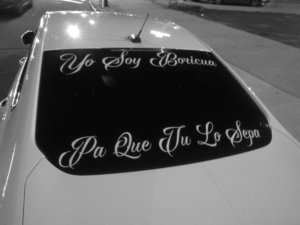Read More]]>
This linguistic landscape is not only telling us that the owner of this vehicle is Puerto Rican, but that they are proud of it. The symbol is emphatic, with the use of an exclamation mark at the end of the quote. The history of this quote specifically is that in 1995, Taino (Joel Bosch) released a song with the title of this quote. Following this, the quote became a symbol for Puerto Ricans around the world, and nearly an icon. In New York City, at the Puerto Rican Day Parade, this quote is still chanted by many. This sign gives me a clue that this neighborhood may have a population of Puerto Rican people. I know this for a fact, as I went to a high school two blocks from this sign, and have a lot of Puerto Rican friends who live in the area. This sign is written in Spanish, yet it’s ‘slang’. This is because it does not follow the proper grammar of written Spanish. This is most likely due to the fact that the symbol is meant to reinforce Puerto Rican pride, and grab the attention of the reader. The improper grammar is also a means of being unique and displaying part of the Puerto Rican culture (through its language).

- Do you think I should go beyond the sign in this neighborhood, and go more in-depth on what my Puerto Rican friends who live there have told me?
- How could I add to my first, description paragraph?

A) This picture was taken in Woodside. Specifically, on Northern Blvd and 51st St. I see this car here all the time, as I bike past this cross street daily. I went to Bryant High School, which is about four blocks from where this picture was taken, and there are a multitude of Hispanics, specifically Puerto Ricans that live in the area.
B) the language used is Spanish. There is no English definition on the sign itself. This is because the message is meant to convey that the owner of this car is prideful in their Hispanic heritage.
C) The message reads
“I am Puerto Rican
Just so you know”
Read More]]>
My dialect of English includes quite a few flaws I wasn’t made aware of until recently. For example, just last week, I was telling a coworker (he is not originially from New York) a story and I said “So I was standing on line…” My coworker immediately mocked me “on line?” he asked. I was shocked. I asked him if “in line” was correct and he said according to the conventions of standard spoken English, “in line” is more commonly used, and therefore regarded as correct. I couldn’t believe I had been saying this simple phrase wrong my entire life. Furthermore, people often associate a heavy accent with “New Yorker” English. I see this as negative, as I do not possess this accent, yet many people that I meet criticize me as being a liar when I tell them I’m from New York City. It usually leads to an argument on whether or not you must have a regional accent- and I say no. For this reason, I believe there general public views my language and dialect as stigmatized.
There are quite a few factors that go into people’s determination of how they percieve a particular dialect. For example, I personally percieve people from mid-west U.S. and more Southern States as less intelligent in general. This is nearly solely due to the “Southern accent” that a lot of regions in the U.S. contain. I feel that when it comes to the perception of Northeastern American English, people stigmatize it. This is due to social status mainly, but partially racially as well. Socially, people generally see New Yorkers as lower-class and less intelligent. Racially, many white Southern-State Americans are aware that there are a plethora of immigrants in New York City especially, and this view our dialect as highly broken English.
]]>